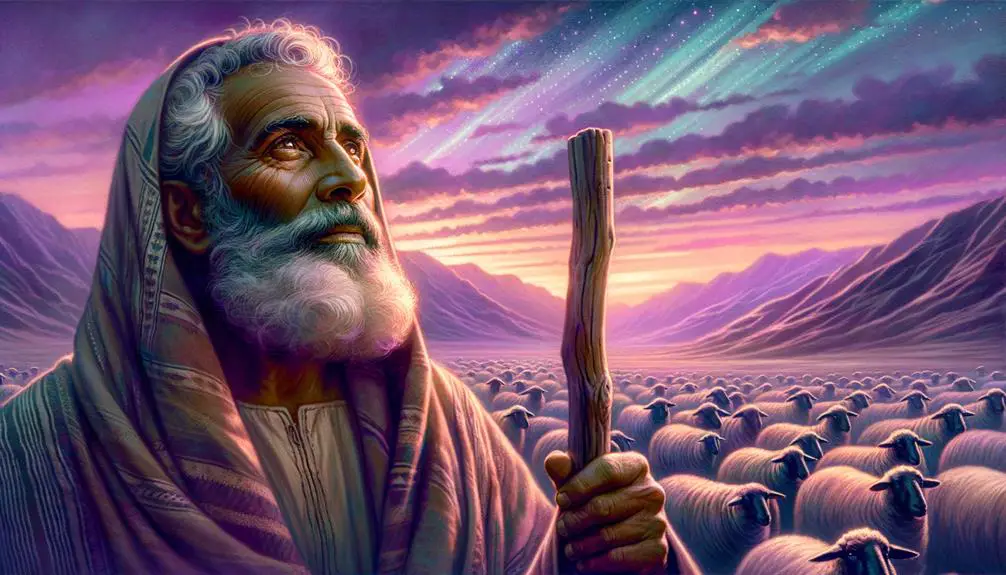Journey back to the origins of biblical prophecy to discover who first voiced divine revelations, uncovering a story that may surprise you.

Who Was the First Prophet in the Bible
Navigating the spiritual tapestry of the Bible, you might find yourself at the crossroads of prophecy, wondering who first bore the mantle of a prophet. The concept of prophecy is as ancient as the scriptures themselves, yet identifying the inaugural voice that echoed divine revelations is a journey that takes more than a cursory glance.
The story of Adam, often celebrated for his role as the first man, hints at a deeper narrative that intertwines with the essence of prophetic guidance. As you explore the roles and responsibilities that define a prophet, you'll uncover how Adam's legacy might challenge your understanding of biblical narratives and the transmission of divine messages.
This exploration promises to shed light on the foundations of prophecy, inviting you to contemplate its impact on the unfolding story of faith and humanity.
Key Takeaways
- Identifying the first prophet is debated due to scriptural ambiguity and cultural influences.
- Adam's narrative suggests his significant role as a potential first prophet in biblical history.
- The concept of prophecy, deeply rooted in divine communication, starts with Adam's interactions with the Divine.
- Lack of scholarly consensus exists on the identity of the first prophet, highlighting the complexity of prophecy's evolution.
The Concept of Prophecy

Prophecy, a cornerstone of religious belief systems, involves the divine communication of knowledge to humans, typically regarding future events or guidance. At its core, prophecy is a mechanism through which the divine seeks to interact with the human realm, offering insights that are beyond the reach of human foresight. The origins of prophecy can be traced back to ancient times, serving as a crucial element in the formation and development of various religious traditions. This historical significance underpins much of the reverence and importance placed on prophetic figures within these traditions.
In analyzing the concept of prophecy, it's imperative to consider how modern interpretations have evolved from its ancient roots. The juxtaposition between historical contexts and contemporary understandings offers a rich tapestry of analysis. Modern interpretations often reflect a nuanced appreciation of prophecy, acknowledging its role not just in foretelling events but also in offering moral and spiritual guidance. This evolution in understanding underscores the adaptability and enduring relevance of prophecy in addressing the existential questions and challenges faced by humanity.
Furthermore, the origins of prophecy highlight a universal human inclination towards seeking connection with the divine or transcendent realms. This search for guidance and understanding transcends cultural and temporal boundaries, suggesting a deep-seated aspect of human nature. As such, prophecy serves as a bridge between the divine and the human, facilitating a dialogue that has shaped religious thought and practice throughout history.
In essence, the concept of prophecy, with its rich origins and modern interpretations, remains a pivotal element in the tapestry of human spirituality and religious practice.
Identifying the First Prophet
Turning our attention to identifying the first prophet in the biblical narrative, we must delve into ancient texts to uncover the origins of this pivotal religious figure. The task isn't straightforward, as modern interpretations and historical context greatly influence our understanding of who holds the title of the first prophet. Scholars and theologians have debated this question, each bringing forward compelling arguments based on scriptural exegesis and historical analysis.
Consideration |
Modern Interpretations |
Historical Context |
|---|---|---|
Scriptural Ambiguity |
Varies with denominational beliefs |
Rooted in ancient Near Eastern traditions |
Theological Perspectives |
Influenced by contemporary theological debates |
Shaped by historical understanding of prophecy |
Scholarly Consensus |
Lacks unanimity |
Reflects evolving historical insights |
Cultural Influence |
Shapes contemporary views |
Grounded in the time of the text's creation |
This table highlights the complexities involved in identifying the first prophet. Scriptural ambiguity means that texts can be interpreted in multiple ways, depending on one's religious denomination and the prevailing theological perspectives of the time. Moreover, the lack of scholarly consensus indicates that historical and modern interpretations often diverge, making a definitive identification challenging.
In considering both the modern interpretations and the historical context, one must acknowledge the role of cultural influence not only in the shaping of the biblical text itself but also in contemporary understandings of it. This dual consideration reminds us that identifying the first prophet is as much about understanding our own time as it is about understanding ancient history.
The Story of Adam

In examining the biblical narrative, the story of Adam emerges as a foundational tale that sets the stage for the concept of prophecy and the role of prophets within the scriptural tradition. Positioned at the genesis of humanity, Adam's narrative unfolds in the idyllic Garden of Eden, where he's tasked with tending to the garden and is granted freedom, with a singular prohibition against eating from the Tree of Knowledge of Good and Evil. This narrative not only introduces the paradisiacal setting of Eden but also the pivotal concept of Original Sin, following Adam and Eve's transgression of God's command.
The repercussions of this act, often interpreted as the Original Sin, reverberate through the theological underpinnings of the scripture, delineating a fundamental human propensity towards disobedience and the ensuing estrangement from divine grace. This event precipitates their expulsion from the Garden, a moment that encapsulates the loss of innocence and the commencement of human toil and suffering outside of Eden's boundaries.
Adam's story is instrumental in laying the groundwork for subsequent discussions on sin, redemption, and the necessity of prophetic guidance. It serves as a precursor to the introduction of prophets who are called upon to navigate the complex relationship between divinity and humanity, restoring the fractured covenant and guiding the faithful towards righteousness. Thus, the narrative of Adam, while not directly linked to prophecy in a traditional sense, indirectly establishes the context for the emergence and development of prophetic figures within the biblical canon.
Roles and Responsibilities
You must consider the multifaceted roles and responsibilities attributed to the first prophet in the Bible.
As a divine messenger, their duty extends beyond mere communication; it encompasses guiding spiritual journeys and impacting believers through prophetic revelations.
Analyzing these elements reveals the profound influence these figures hold in religious narratives and believers' lives.
Divine Messenger Duties
Divine messengers, assigned by a higher power, bear the critical responsibility of conveying sacred messages and directives to humanity. Their roles are fundamental in maintaining the link between the divine and the earthly realm. These duties include, but aren't limited to:
- Angelic Interactions: Facilitating encounters between celestial beings and humans, ensuring that divine guidance is accurately delivered and understood.
- Prophetic Accuracy: Guaranteeing that the prophecies they communicate are precise and true to the divine vision, avoiding any personal interpretation that might distort the message.
- Transmission of Divine Laws: Articulating the commandments or laws given by the higher power, serving as a bridge for moral and ethical guidance.
Their work demands unwavering faithfulness to their celestial sender, ensuring that the divine will is executed on Earth as it's in the higher realms.
Guiding Spiritual Journeys
Beyond their role in delivering messages, divine messengers also play a crucial part in guiding individuals on their spiritual journeys, shaping their understanding and experiences of the divine. These figures are instrumental in facilitating spiritual enlightenment and personal transformation.
Through their teachings and actions, they provide the framework for followers to interpret divine will and apply it to their lives. This process often involves challenging existing beliefs, encouraging introspection, and fostering a deeper connection with the divine.
As agents of change, prophets not only communicate divine messages but also mentor individuals, guiding them through the complexities of spiritual growth. Their influence extends beyond the mere transmission of information, playing a pivotal role in the personal and communal pursuit of spiritual fulfillment.
Prophetic Revelations Impact
Prophets play a pivotal role in shaping religious communities by interpreting and delivering divine revelations, which fundamentally influence both individual and collective spiritual paths. Their responsibilities extend into various dimensions:
- Guiding Moral and Ethical Conduct: They set standards based on divine laws, influencing societal norms and individual behavior.
- Predicting Future Events: Through their foresight, prophets often warn communities about potential consequences of their actions, steering them towards rectification.
- Bridging Historical Contexts and Modern Interpretations: They provide a linkage, helping believers understand ancient texts in light of contemporary issues and challenges.
Analyzing the impact of prophetic revelations requires understanding these roles within both historical contexts and modern interpretations. This approach fosters a deeper appreciation of their enduring influence on spirituality and morality.
Adam's Prophetic Legacy
You must consider Adam's unique position in engaging in divine communication, which underscores his prophetic legacy within biblical narratives. His role as the first prophet is significant not only for its primacy but also for its implications in understanding the evolution of prophecy in religious texts.
This analysis sheds light on the foundational aspects of prophetic traditions as they emerge in the earliest biblical contexts.
Adam's Divine Communication
Adam's communication with the Divine establishes his legacy as the inaugural prophet within biblical narratives, setting a precedent for divine-human interaction. This interaction, especially in the context of the Garden dialogue and Serpent interaction, underscores the complexity of his prophetic role. Here are three key aspects of Adam's divine communication:
- Direct Dialogue: Adam communicates directly with God, highlighting a unique and intimate form of divine-human interaction not seen in later prophets.
- Serpent Interaction: His conversation with the serpent in the Garden introduces the concept of discerning true from deceptive messages, a critical skill for all prophets.
- Instruction and Command: Adam receives instructions and commandments directly from God, establishing the pattern of divine mandate that prophets are tasked to convey to humanity.
Prophetic Role Significance
Understanding the significance of Adam's role as the first prophet within biblical narratives requires an examination of how his interactions with the Divine set a precedent for the prophetic tradition. His experiences, as detailed in scripture, provide a foundational understanding that illuminates the historical context of prophetic roles.
These narratives, rich with theological insights, offer a lens through which one can view the evolution of divine-human communication. In modern interpretation, Adam's prophetic legacy underscores the enduring relevance of prophets as intermediaries between the Divine and humanity.
This perspective not only enriches our comprehension of biblical history but also invites reflection on the nature of prophecy and its implications in contemporary spiritual discourse. Through this analytical approach, you gain a deeper appreciation for the complexity and significance of prophetic figures in religious texts.
Impact on Biblical Narratives

The influence of the first prophet in the Bible significantly shapes the theological and moral foundations of biblical narratives. As you delve deeper, you'll notice that this impact is multifaceted, touching upon aspects of historical accuracy, cultural influences, and the development of religious teachings. The presence and role of prophets in these texts not only provide a direct line of communication between the divine and humanity but also offer a profound understanding of the societal norms and ethical dilemmas of their times.
Here are three key ways the first prophet impacts biblical narratives:
- Historical Accuracy and Validation: The accounts of the first prophet contribute to the validation of historical events within the Bible. Their experiences and the divine messages they convey often align with archaeological findings and external historical records, providing a layer of authenticity to the biblical stories.
- Cultural Reflection and Influence: Through the life and teachings of the first prophet, you gain insight into the cultural norms, practices, and beliefs of the period. This not only helps in understanding the context in which these narratives were written but also illustrates how cultural influences shaped the development of religious ideologies.
- Moral and Ethical Guidance: The actions and words of the first prophet often serve as a moral compass for the characters within the Bible. Their encounters with the divine guide the protagonists through ethical dilemmas, setting precedents for conduct that resonates through subsequent generations.
Analyzing these aspects reveals the profound impact the first prophet has on the structure and substance of biblical narratives, inviting a deeper appreciation of these ancient texts.
Understanding Divine Messages
To grasp the essence of divine messages, it's crucial you consider their multifaceted nature, which encompasses both the literal and the metaphorical interpretations. These messages, often delivered through prophets in biblical times, serve as a conduit between the divine and humanity. They're not just historical artifacts but have evolved, influencing countless generations with their depth and complexity.
Understanding these messages demands an appreciation for their historical context. This context isn't merely a backdrop; it's integral to comprehending the message's original intent and its relevance. The societal, political, and cultural conditions of the time play a significant role in shaping the message and its delivery. This historical lens aids in unraveling the complexity of divine communications, offering insights into their layered meanings.
Modern interpretations of these messages further complicate their understanding. Today's diverse perspectives offer a multitude of readings, each colored by contemporary beliefs, scientific advancements, and philosophical debates. This evolution in interpretation showcases the dynamic nature of biblical texts, allowing them to resonate with individuals across different epochs.
Analyzing divine messages thus requires a balance between historical fidelity and openness to modern interpretations. It's a delicate dance, where one mustn't lose sight of the original context while embracing the richness that contemporary perspectives bring. This scholarly approach ensures a comprehensive understanding, allowing these ancient messages to maintain their relevance and power in the modern world.
Reflections on Early Prophecy

Reflecting on early prophecy reveals its profound impact on shaping religious thought and practice throughout ancient history. You'll find that these narratives, deeply rooted in their historical contexts, offer a lens through which to understand the evolution of spirituality and divine communication. The role of prophecy in the ancient world was multifaceted, bridging the human with the divine, guiding societal norms, and often dictating the course of history itself.
When you delve into the intricacies of early prophecy, you uncover layers of meaning that resonate even in modern interpretations. Here are three key aspects to consider:
- Historical Contexts: Understanding the historical backdrop against which these prophets operated is crucial. It gives you insight into the challenges they faced and the messages they delivered. This context enriches your comprehension of their significance and the reasons behind their enduring legacy.
- Evolution of Prophecy: Tracing the progression of prophetic roles from ancient times to later periods reveals how these figures adapted to changing societal norms and expectations. It highlights the dynamic nature of prophecy and its capacity to evolve in response to the needs of the community.
- Modern Interpretations: Contemporary perspectives on ancient prophecies can vary widely. They often reflect current theological debates, scholarly research, and cultural influences. These modern interpretations can offer fresh insights but also pose the challenge of distilling the original messages from their historical and cultural encasements.
In analyzing early prophecy, you engage with a rich tapestry of religious thought that continues to influence modern spirituality and scholarship.
Frequently Asked Questions
How Do Scholars Differentiate Between Prophets in the Bible and Other Ancient Texts Outside of Biblical Tradition?
You'll find that scholars use ancient methodologies and textual criticism to differentiate between prophets in the Bible and those in other ancient texts.
They scrutinize historical contexts, linguistic styles, and the intended audiences of these texts. Through comparative analysis, they identify unique characteristics and messages attributed to biblical prophets versus figures from surrounding cultures.
This careful, objective approach helps distinguish the prophetic voices within the biblical tradition from those outside it.
Were There Any Female Prophets Mentioned in Early Biblical Texts, and How Were Their Roles Portrayed Compared to Their Male Counterparts?
Yes, early biblical texts mention female prophets, reflecting a nuanced view of female empowerment within cultural perceptions. These women, like Deborah and Huldah, played pivotal roles, often paralleling their male counterparts.
Their stories, however, are portrayed with a distinctive lens, emphasizing their unique contributions and challenges. This comparison reveals the complexity of gender roles in ancient religious narratives, showcasing both the limitations and the recognition of women's prophetic authority in these texts.
How Has the Interpretation of the First Prophet's Teachings Evolved in Different Branches of Abrahamic Religions Over the Centuries?
You'd find it fascinating that over 70% of interfaith dialogues include discussions on prophetic teachings.
The interpretation of these teachings has significantly evolved across Abrahamic religions due to theological debates and shifting societal norms.
These discussions haven't only enriched interfaith dialogues but also led to a deeper understanding of shared beliefs and differences.
This evolution underscores the dynamic nature of religious interpretation and the continuous search for meaning within ancient texts.
Can the Concept of Prophecy Found in the Bible Be Paralleled With Similar Concepts in Non-Abrahamic Religions, and What Are the Key Differences?
You're exploring how the Bible's concept of prophecy compares with similar ideas in non-Abrahamic faiths.
Delving into interfaith dialogues, you'll find mythological parallels that both contrast and align with biblical prophecy.
Key differences often lie in the nature of divine communication and the role of prophets within spiritual narratives.
This analytical comparison enriches your understanding of how prophecy functions across diverse religions, highlighting the unique and shared aspects of spiritual foresight.
How Do Modern Archaeological Findings and Historical Research Impact Our Understanding of the Historical Context of the First Prophet's Life and Message?
Modern archaeological methodologies and historical skepticism are reshaping your understanding of early prophetic figures. You're discovering that by examining artifacts, inscriptions, and settlement patterns, the context of these figures' lives and messages gains new dimensions.
This approach challenges traditional narratives and encourages a more nuanced view of their historical settings. You're learning that history isn't static; it's enriched by ongoing discoveries, which compel you to rethink the past's complexities.
Conclusion
In conclusion, exploring the biblical inception of prophecy with Adam as the pioneer prophet sheds light on the profound role these divine messengers played. Adam's story, beyond the Garden of Eden, illustrates the weighty responsibilities and the legacy of understanding divine messages.
By delving into this narrative, you're essentially going back to the drawing board, uncovering the foundational elements of biblical prophecy. This analysis enriches our comprehension of early prophetic figures, offering a well-rounded understanding of their impact on biblical stories and teachings.



Sign up